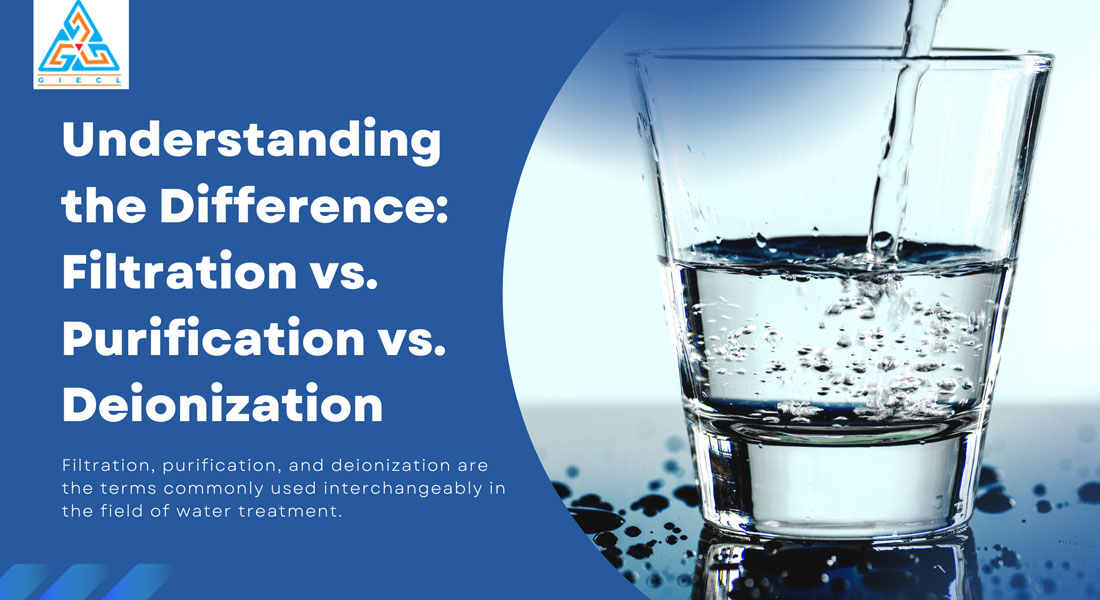
 By Admin |
By Admin |  July 7, 2025
July 7, 2025
Filtration, purification, and deionization are the terms commonly used interchangeably in the field of water treatment. However, all three processes are different in terms of purpose, method, and result. Be an industrial user, a plant operator, or an engineer designing a turnkey solution. These distinctions are what you should know as a matter of selecting the appropriate water treatment.

Filtration is either the mechanical or physical process that filters/moves the suspended matter, silt, and range of impurities out of water via the filtration of water through a layered material like sand, gravel, or the use of activated carbon. It is usually the initial step in the process of water treatment that aims at capturing and discarding apparent pollution, such as dust, rust, organic materials, and silt. Filtration enhances the look and taste of the water yet fails to kill dissolved salts, bacteria, and viruses. The GIECL-designed filters are pre-designed for use in RO plants, formulation of mineral water systems, and industrial functionalities to increase the life of downstream purifiers accessible and their efficiencies.
How it works - Water is forced through the filter media (pertaining to sand, gravel, activated carbon, or membrane), and particles congested by the filter media are discarded.
At GIECL, we integrate multi-grade filtration methods in our mineral water, and the RO plant develops as a pre-treatment stage.
Purified Water Generation System can be termed as an all-inclusive process of cleaning the water in such a way that it rids all types of impurities, such as physical, chemical, and biological impurities, and leaves it in a form that makes the water drinkable or usable in other industrial processes.
Dissolved salts, microorganisms, heavy metals, organic chemicals, odor, or non-agreeables can be removed by the purification extraction method. Various industries including pharmaceutical, food and beverage, and the bottle industry depend on water purification systems. GIECL is a specialist in the designing and manufacturing of an integrated purification system with high standards of quality and delivers clean, safe, and compliant water to diverse commercial and industrial usage.
The multiple purification technologies of GIECL modules deliver turnkey purification systems that are integrated to address the specifically customized client needs in the world.
Deionization (DI) is a chemical water treatment technique that eliminates dissolved ionic forms of contaminants positive (cations) and negative (anions), with the use of ion-exchange resins. The presence of these resins eliminates damaging ions and substituted with hydrogen (hydrogen (H⁺) and hydroxide (OH) ions that are fused to construct pure water (H 20). The result is outstanding with low TDS (Total Dissolved Solids) water, which is beneficial in those industries that require high-purity by-products like pharmaceuticals, laboratories, semiconductors, and boilers. GIECL works on advanced DI and EDI systems that offer a constant supply of deionized water with the most straightforward maintenance, so this approach is reliable, performs, and is precise in complex applications.
How it works - The cations and anions exchange resins to filter water by eliminating the positively charged ions and negatively charged ions.
GIECL provides water polishing and EDI (Electrodeionization) assemblies and also includes totally automatic DI Water Generation systems for customers who require ultra-low TDS varieties. Connect with us for a complete Deionized Water Systems.
| Parameter | Filtration | Purification | Deionization |
|---|---|---|---|
| Process Type | Physical | Physical + Chemical/Biological | Chemical (Ion exchange) |
| Removes | Particles, sediment | Salts, microbes, chemicals | Dissolved ions |
| Key Technologies | Sand/Carbon filters | RO, UV, UF, Ozone | DI resin, EDI modules |
| Best For | Pre-treatment, clarity | Safe drinking, process water | High-purity/industrial water |
As a leading DM Plant Manufacturer, we at GIECL do not provide systems that can be fitted to everyone. Depending on what kind of water, the source of the water, and the use of the water, we can put all these processes together in the appropriate sequence:
Be it for a mineral water bottling plant, industrial RO plant, or the necessity of personalized water systems, be it food, pharma, or electronics, our solutions have it all with quality, compliance, and performance.
The difference between filtration, purification, and deionization will assist you in making the correct decision when selecting a solution that fits the requirement of treating water. Though filtration is regarding clarity, purification is regarding keeping safe, and deionization is regarding purity- and this combination makes sure of stable water treatment in all industries.
Contact GIECL today for expert consultation and turnkey project support
© Copyright 1996 - Gujarat Ion Exchange And Chemicals Limited. All Rights Reserved
Powered By: #1 Vinayak InfoSoft - SEO Company Ahmedabad